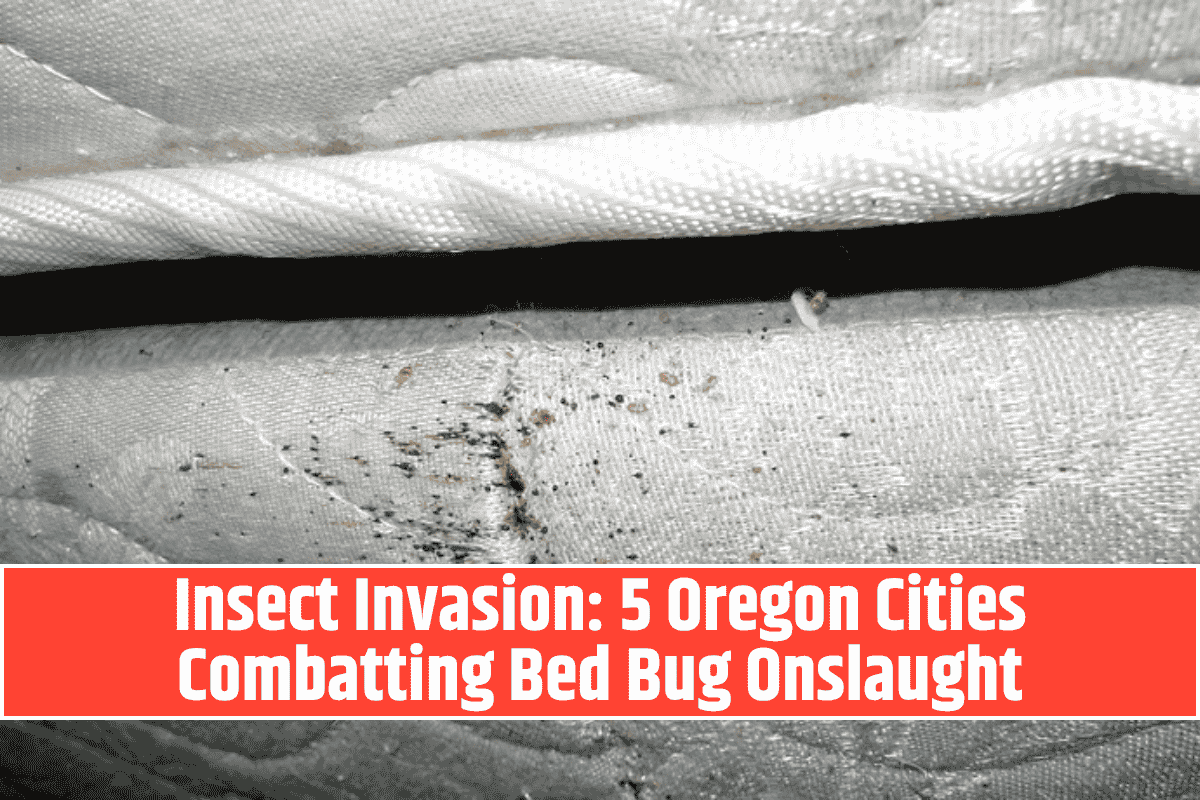Oregon is currently facing a significant surge in bed bug infestations, with several cities grappling with persistent issues. These infestations have been driven by a combination of climate, travel, and public awareness challenges.
According to recent data from Orkin, three Oregon metro areas have been identified as some of the most bed-bug-infested cities in the United States for the 2024–2025 period.
This includes Portland, Eugene-Springfield, and Medford-Klamath Falls, all of which are working hard to address the growing issue.
The Top Bed Bug Hotspots in Oregon
Portland: As Oregon’s largest city and a major travel hub, Portland has seen a high volume of bed bug cases. The city’s dense population and bustling urban environment create favorable conditions for bed bugs to thrive.
Its status as a tourist and business hub also contributes to the ease with which bed bugs can spread, often hitching rides on luggage, clothing, or public transportation.
Eugene-Springfield: Known for its universities, local tourism, and vibrant cultural scene, the Eugene-Springfield area faces its own struggles with bed bug control. The area has a steady influx of students and tourists, which increases the chances of bed bugs being introduced to homes, hotels, and other public spaces.
Medford-Klamath Falls: This southern Oregon region, which includes popular tourist destinations and local hospitality venues, is also on the list. The high volume of interstate travel, combined with the region’s significant hotel and accommodation industry, makes it a prime location for bed bug infestations.
While Portland, Eugene-Springfield, and Medford-Klamath Falls top the list, other cities like Salem and Bend are also experiencing rising bed bug complaints. The increase in reports has prompted local health agencies and pest control services to heighten their response efforts.
Why the Invasion?
Several factors contribute to the current bed bug crisis in Oregon:
Climate: Oregon’s humid, temperate climate creates ideal breeding conditions for bed bugs, making it easier for infestations to thrive and spread. The mild weather, combined with high levels of rainfall, offers the perfect environment for these pests to reproduce.
Travel: With high volumes of tourists and transient residents, Oregon sees a significant influx of people from other parts of the country and the world. This leads to an increased chance of bed bugs being brought into the state through luggage, clothing, or even public transportation like buses and trains.
Awareness Gaps: One of the challenges in combating the bed bug surge is limited public awareness. Many residents fail to spot the early signs of an infestation, allowing bed bugs to multiply and spread before they’re properly addressed. Lack of knowledge about prevention and treatment contributes to the problem.
How Are Cities Responding?
Oregon cities are taking several measures to combat the growing bed bug problem:
Public Education Campaigns: Local governments and pest control agencies have ramped up public education campaigns to teach residents how to spot the signs of a bed bug infestation and how to manage or prevent them. These campaigns include distributing information through media outlets, community centers, and online resources.
Increased Coordination: Cities are working with property managers, hotels, and local health agencies to encourage routine inspections and better collaboration in tackling infestations. Hotels and landlords are being urged to regularly check for signs of bed bugs to prevent them from spreading to new tenants or guests.
Pest Control Partnerships: Cities are forming partnerships with pest control companies to ensure quick action when outbreaks occur. These companies are equipped with the latest technology and methods for eliminating bed bugs effectively and preventing re-infestations.
Practical Advice for Residents
Oregon residents can take steps to protect themselves from bed bugs, especially when traveling or staying in hotels. Here are some practical tips to prevent infestations:
Inspect Hotels and Rentals: Before unpacking, thoroughly inspect your hotel room, hostel, or rental property for signs of bed bugs. Look for small dark spots on mattresses, bedding, and furniture that could indicate the presence of bed bugs.
Keep Luggage Off the Floor: When staying in hotels or hostels, avoid placing luggage directly on the floor or bed. Use luggage racks or place your bags on a hard surface to reduce the risk of bed bugs crawling into your belongings.
Wash Clothes in Hot Water: After traveling, wash all clothing in hot water and dry them on high heat. Bed bugs cannot survive high temperatures, so this can help eliminate any pests that may have hitchhiked into your luggage.
Report Infestations Immediately: If you spot signs of a bed bug infestation, report it immediately to the property manager or local health authorities. Early detection and prompt action are key to controlling bed bug populations before they spread.
Oregon’s cities, particularly Portland, Eugene-Springfield, and Medford-Klamath Falls, are facing a significant bed bug invasion in 2024–2025. Factors such as the state’s climate, high travel volumes, and gaps in public awareness have fueled the rise in infestations.
Local authorities and pest control agencies are stepping up efforts with education campaigns, routine inspections, and quick response strategies to curb the problem.
Residents are encouraged to stay vigilant, inspect their accommodations, and take preventive measures to avoid bringing bed bugs into their homes. With community action and public awareness, Oregon can hopefully regain control over this growing issue.
[1] https://theashlandchronicle.com/oregon-is-crawling-with-bed-bugs-3-cities-among-most-infested/
[2] https://www.orkin.com/press-room/worst-cities-for-bed-bugs-annual-rankings
[3] https://b105country.com/terminix-bed-big-infested-cities-2025/












